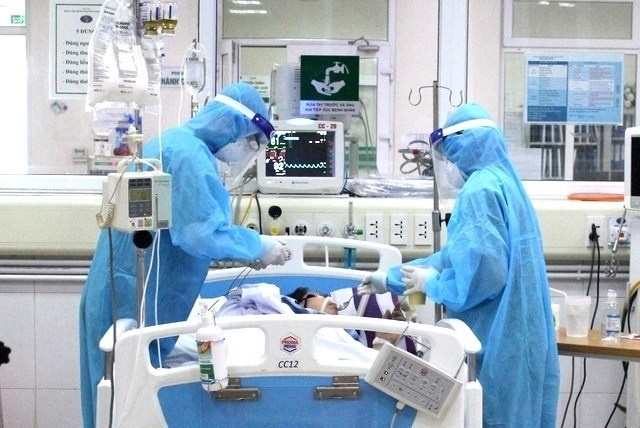White-collar soldiers continue fight against disease
 |
| White-collar soldiers continue fight against disease, photo VNA |
Duong Minh Tuan, a doctor in the central provnce of Quang Binh, joined thousands of other medical staff in the fight against the pandemic in the south. As horrifying scenes unfolded before his eyes, the doctor considered penning a will. Suddenly, the title of the song “If I only had one day left to live” entered his mind. Tuan wondered what he should do if this was his final day.
He promptly decided to focus on his patients and help those who have to place their trust in healthcare workers to save their lives.
Tuan recalled that ambulances were continually coming and going to his workplace while the patient load was soaring. “There were times when a larger number of patients fell into an emergency situation, yet medical personnel were insufficient. I might not be able to save everyone, but I committed to helping as many as possible to reunite with their families. With that in mind, I was able to ease my bewilderment and disappointment and continue fulfilling my duty,” Tuan said.
As for Hoang Thi Phu Bang, deputy head of Social Work at Bach Mai Hospital, the 77 days in the health centre where she worked in Ho Chi Minh City were highly stressful. She flew to the city when the pandemic was at its peak and began work right away.
“We contacted the patients’ relatives to inform them of their conditions while encouraging and consoling them. Because all of the patients were separated from their families, we made every effort to alleviate their distress,” Bang said.
Bang shared that in the first five weeks in Ho Chi Minh City, she and her colleagues worked intensively without any time to rest. At that time, every briefing announced the number of deaths in double digits. They had never sensed the fragility of life so acutely. It is the patient’s recovery that serves as the greatest spiritual medication to the medical staff, motivating them to continue fighting for every second to save more lives.
“Even though everyone was wearing masks, I could still recognise their happy smiles. Seeing the patient’s eyes light up with joy, hearing their words of gratitude, and waving goodbye to them is something that felt so natural at first but has grown to be so precious and uplifting to us now,” Bang added.
Le Minh Khoi, a doctor at Ho Chi Minh City University of Medicine and Pharmacy Hospital, joined the consulting group for F0 cases by phone shortly after the peak emerged. But when the health crisis reached its climax, they suffered extreme disappointment due to their inability to find enough patient facilities.
With strong determination, Khoi took over the COVID-19 Patient Resuscitation Center located at City International Hospital in the west. Initially, the staff faced a significant challenge of lacking experience dealing with the pandemic. Some could not even identify the difference between an ultrasound machine and a ventilator. As a team captain, Khoi established a unique lecture hall in the field centre.
“We conducted online training during our break times and between shifts. We covered fundamental knowledge in using technical equipment and monitoring the patients’ figures. We also learned to manage the treatment centre effectively,” Khoi said.
When a fresh wave of the pandemic hit the south, frontline medical staff lost the idea of relaxation. As a veteran doctor in the field of emergency resuscitation at the Central Hospital for Tropical Diseases, Pham Van Phuc still could not imagine the harshness of this outbreak. Phuc and many of his colleagues were traumatised by the ever-increasing number of patients and deaths. Even when he slept, he could hear the beeping of the ventilator lingering in his ears.
However, seeing patients on ventilators and their families watching on from a distance encouraged the staff to move forward even if there was just a glimmer of hope remaining. “We were overjoyed when a new patient was discharged. We understand better than anyone else that their hospital days will become an indelible memory. A patient on a ventilator once showed me a piece of paper that said ‘When will I die, doctor?’ That sentence had a profound effect on us, diminishing our sufferings and strengthening our faith in fighting for their lives,” Phuc said.
What the stars mean:
★ Poor ★ ★ Promising ★★★ Good ★★★★ Very good ★★★★★ Exceptional
Themes: Healthcare Platform
- Hanoi intensifies airport monitoring amid Nipah disease risks
- Cosmetics rules set for overhaul under draft decree
- Policy obstacles being addressed in drug licensing and renewal
- Sanofi, Long Chau Pharmacy relaunch medicine blister pack collection initiative
- Takeda Vietnam awarded for ongoing support of Vietnam’s sustainability efforts
Related Contents
Latest News
More News
- Hanoi intensifies airport monitoring amid Nipah disease risks (January 29, 2026 | 15:21)
- List of newly-elected members of 14th Political Bureau announced (January 23, 2026 | 16:27)
- 14th Party Central Committee unanimously elects To Lam as General Secretary (January 23, 2026 | 16:22)
- List of members of 14th Party Central Committee announced (January 23, 2026 | 09:12)
- Highlights of fourth working day of 14th National Party Congress (January 23, 2026 | 09:06)
- Press provides timely, accurate coverage of 14th National Party Congress (January 22, 2026 | 09:49)
- Press release on second working day of 14th National Party Congress (January 22, 2026 | 09:19)
- Minister sets out key directions to promote intrinsic strength of Vietnamese culture (January 22, 2026 | 09:16)
- 14th National Party Congress: Renewed momentum for OVs to contribute to homeland (January 21, 2026 | 09:49)
- Party Congress building momentum for a new era of national growth (January 20, 2026 | 15:00)

 Tag:
Tag:




















 Mobile Version
Mobile Version